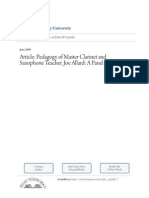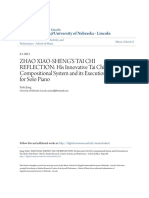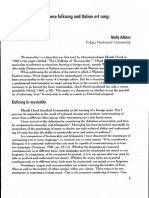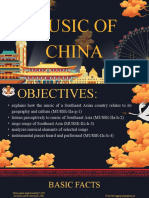Final Project
Final Project
Uploaded by
linusleeCopyright:
Available Formats
Final Project
Final Project
Uploaded by
linusleeCopyright
Available Formats
Share this document
Did you find this document useful?
Is this content inappropriate?
Copyright:
Available Formats
Final Project
Final Project
Uploaded by
linusleeCopyright:
Available Formats
A distinguished Chinese composer, Yongkang Shi was born in 1929.
Currently, in his
90s he had held teaching posts at the Shanghai Conservatory of Music and Xinghai
Conservatory of Music and remains on the faculty of Xinghai Conservatory of Music.
His compositions cover a wide range including symphony, chamber music, and dance
music works. I had the privilege and it was a great honor for me to interview him in
his private residence in Guangzhou, China.
Prof. Shi received his initial education at an orphanage in Shanghai in the 1930s. In
late 1930 a professor from Shanghai National Music School(which later become the
Shanghai Conservatory of Music) gave a performance at the orphanage and Prof. Shi
felt attached to music and decided to pursue music as a career. “It was a tumultuous
time”, commented Prof. Shi during the interview, “as the Sino-Japanese War has just
begun”. He learned violin and composition at a secondary school shortly after the
victory of the war and entered the Shanghai Conservatory of Music in 1949. His
graduation work, “The story of the Yellow Crane” was premiered by Shanghai
Symphony Orchestra and gained high appraisal. That’s when his career finally took
off as he joined the faculty of Shanghai Conservatory.
In the years following his appointment, Prof. Shi composed a variety of works
orchestral, chamber music, as well as solo works. His orchestration publication has
been selected as a designated textbook by many Chinese conservatories. Many of his
students grown on to become faculty members in prestigious institutions around
China, some of them are also successful composers and conductors.
Already in his 90s, Prof. Shi remains on the faculty of the composition department at
the Xinghai Conservatory of Music. Today almost 100% of his income is made up of
teaching, with a slight income in occasional recording projects and national
allowance. Things were very different 20 years ago. 80%(around that, according to
Prof. Shi) of his income came from his conservatory teaching, while the remainder is
comprised of contribution fee of academic publications, as well as composition
contracts. Prof Shi says after nearly 70 years in this field, he enjoys working with
talented musicians in different generations and nurturing them, seeing them grow and
distinguish from time to time makes him feel accomplished.
If he could give himself advice at my current stage, he would suggest himself utilize
every possible resource to enrich himself mentally. The 1950s is not as tumultuous as
in the 1930s for Chinese people, but it was still considered a very difficult time. Very
limited musical resources were available at that time as the country was still healing
from World War II and the civil war. He would seize every chance to figure out any
question in mind and to lay the building block for a successful artist.
There were many pieces of advice that Prof. Shi was able to provide as a successful
musician. As a pedagogue, he encourages me to attend as many concerts as possible,
to shape a general mind of what music should be like. We should also explore lesser-
known works, as some of them are real masterpieces that people rarely perform or
even study. As a pianist, he encouraged me to do as much collaboration work as
possible, as chamber music is very much neglected in China(there was a stereotype in
China that chamber music is designed for people who lack solo techniques for a long
period). “It is really exciting when we get to collaborate with somebody we feel the
same”, says Prof. Shi during the interview. As a composer, he would advise all
composition students to never be afraid of improvising and innovating. His French
Horn Concerto “Memory” was a perfect example as unconventional harmonies and
textures are employed. Finally a piece of general advice to all students after being a
pedagogue for over fifty years: Be patient and wait for your unique opportunity.
I’ve known Prof. Shi for over a decade, although I’ve never been one of his students,
he has still grown to be my most admired musician and artist. As the first generation
musician that New China nurtured, his experience of living through tumultuous times
of China empowers him to be an assiduous composer and pedagogue. His insights of
life and his seriousness towards music continue to inspire me as a musician and urge
me to hold the highest standard in every aspect of my performance. I was honored to
interview him and his words have left me with great power.
You might also like
- Vocal and Stage Essentials for the Aspiring Female R&B Singer: A Guide to Technique, Performance and MusicianshipFrom EverandVocal and Stage Essentials for the Aspiring Female R&B Singer: A Guide to Technique, Performance and MusicianshipRating: 5 out of 5 stars5/5 (1)
- Pedagogy of Master Clarinet and Saxophone Teacher Joe AllardDocument5 pagesPedagogy of Master Clarinet and Saxophone Teacher Joe Allardapi-236899237100% (2)
- Vietnam Music: Traditional Vietnamese Music Is Highly Diverse and Syncretistic, Combining NativeDocument2 pagesVietnam Music: Traditional Vietnamese Music Is Highly Diverse and Syncretistic, Combining NativeGrace LeeNo ratings yet
- HN 1453 Komponistenbiographie EnglischDocument2 pagesHN 1453 Komponistenbiographie EnglischFelipe BunilhaNo ratings yet
- Week 9 - Follow Up - MUSHL 107 SPR 2024Document6 pagesWeek 9 - Follow Up - MUSHL 107 SPR 2024techward.siNo ratings yet
- Chinese Compositional SytleDocument111 pagesChinese Compositional SytleTim ChongNo ratings yet
- The Characteristics of Violin Arts Developed in ChinaDocument4 pagesThe Characteristics of Violin Arts Developed in Chinas miachieoNo ratings yet
- Chinese Classical MusicDocument23 pagesChinese Classical MusicTafadzwaChinhavaNo ratings yet
- Takemitsu Essay DragonDocument5 pagesTakemitsu Essay DragonMewdicalNo ratings yet
- Music of ChinaDocument3 pagesMusic of Chinadanaya fabregasNo ratings yet
- Chou Wen-Chung: Tribute ToDocument13 pagesChou Wen-Chung: Tribute ToHo laqmbNo ratings yet
- History of MusicDocument125 pagesHistory of MusicomaradnanNo ratings yet
- Booklet LYRCD7461Document21 pagesBooklet LYRCD7461JonathanCorzoNo ratings yet
- Thesis 2013 LuoDocument327 pagesThesis 2013 LuodoraNo ratings yet
- Rozhovor Pre Hudobný ČasopisDocument5 pagesRozhovor Pre Hudobný ČasopisneviemktosomvlastneNo ratings yet
- Chinese MusicDocument16 pagesChinese MusicHannieLeeMaraanNo ratings yet
- Bryant L. Domin-WPS OfficeDocument7 pagesBryant L. Domin-WPS OfficeBryant DomingoNo ratings yet
- Sainkho Namtchylak Mythoi Merging EmergiDocument15 pagesSainkho Namtchylak Mythoi Merging EmergiNikos Valkanos100% (1)
- Music of ChinaDocument18 pagesMusic of ChinaSharmaine Castillo MendozaNo ratings yet
- Conversation With Frans Helmerson by Tim JanofDocument9 pagesConversation With Frans Helmerson by Tim Janofsalecello2113No ratings yet
- Thailand Traditional MusicsDocument14 pagesThailand Traditional Musicsnicoler21No ratings yet
- Thesis in MusicDocument11 pagesThesis in MusicIacob HildaNo ratings yet
- Contemporary Philippine MusicDocument9 pagesContemporary Philippine MusicShendel SedoriosaNo ratings yet
- Chatura Pandit: V.N.Bhatkhande (Footnote 1)Document15 pagesChatura Pandit: V.N.Bhatkhande (Footnote 1)Mph MajNo ratings yet
- Serialism: Ramon P. Santos National Artist For Music (2014)Document2 pagesSerialism: Ramon P. Santos National Artist For Music (2014)Spcs Senior HighNo ratings yet
- Chinese Traditional Music and Culture by Sijia Jamie HuangDocument11 pagesChinese Traditional Music and Culture by Sijia Jamie Huangapi-512800689No ratings yet
- Lennie Tristano His Life in MusicDocument3 pagesLennie Tristano His Life in MusicHorace BasileNo ratings yet
- Xinghai Yellow Piano Concerto (Partitura) (Schott)Document116 pagesXinghai Yellow Piano Concerto (Partitura) (Schott)Janderson RossatoNo ratings yet
- LangLangstudyguide2011 12Document25 pagesLangLangstudyguide2011 12Alice Davis100% (1)
- Final Music - NXT - OriginalDocument3 pagesFinal Music - NXT - Originalsajal sazzadNo ratings yet
- We in Music Are Like Physicists: TH THDocument5 pagesWe in Music Are Like Physicists: TH THTomCafezNo ratings yet
- 20世纪80年代以来中国传统文化对旅美华人作曲家的影响 以钢琴作品为例Document77 pages20世纪80年代以来中国传统文化对旅美华人作曲家的影响 以钢琴作品为例1459626991No ratings yet
- Shibboleths and Ploughshares: Music, emotion, meaning, performanceFrom EverandShibboleths and Ploughshares: Music, emotion, meaning, performanceNo ratings yet
- Personal Plan..es - enDocument4 pagesPersonal Plan..es - enClaudia Veloso AlvarezNo ratings yet
- Symphony No. 1: KomeiDocument9 pagesSymphony No. 1: KomeiJorgeNo ratings yet
- Don Cherry at DartmouthDocument5 pagesDon Cherry at DartmouthUlises RamosNo ratings yet
- Mifl CBZN Id HM WSB GERwzg So DN4 Dvy 8 QT 55 H 1 M L56Document3 pagesMifl CBZN Id HM WSB GERwzg So DN4 Dvy 8 QT 55 H 1 M L56BrinsleyNo ratings yet
- Teaching Piano in China: Building Transcultural and Transhistorical Bridges Through Music EducationDocument9 pagesTeaching Piano in China: Building Transcultural and Transhistorical Bridges Through Music EducationALEXNo ratings yet
- Hua Yanjun (1893-1950) and Liu Tianhua (1895-1932)Document11 pagesHua Yanjun (1893-1950) and Liu Tianhua (1895-1932)Mandy ChengNo ratings yet
- Shunske Sato - InterviewDocument8 pagesShunske Sato - InterviewFrancisco Elías Pereira MacielNo ratings yet
- Bi-Musicality in Japanese Folksong and Italian Art Song:: A Study On Vocal TimbreDocument6 pagesBi-Musicality in Japanese Folksong and Italian Art Song:: A Study On Vocal TimbreJoel Anthony PeñaNo ratings yet
- A Complete History of Music for Schools, Clubs, and Private ReadingFrom EverandA Complete History of Music for Schools, Clubs, and Private ReadingNo ratings yet
- Jeanne Lee by Eric PorterDocument14 pagesJeanne Lee by Eric PorterwrojasNo ratings yet
- Conversation With Bonnie Hampton: by Tim JanofDocument9 pagesConversation With Bonnie Hampton: by Tim Janofsalecello2113No ratings yet
- Meet Bel Canto Composer Jimmy LopezDocument6 pagesMeet Bel Canto Composer Jimmy Lopezjeanm87No ratings yet
- Music of VietnamDocument5 pagesMusic of VietnamNam Giang100% (1)
- Music of ChinaDocument33 pagesMusic of ChinaElay SarandiNo ratings yet
- Tristano As A TeacherDocument26 pagesTristano As A Teachernishtyaki2583100% (3)
- Inayaat Khan 19092 CDBooklet PDFDocument31 pagesInayaat Khan 19092 CDBooklet PDFselassie.rezaNo ratings yet
- Instant ebooks textbook The Traditional Music of Thailand David Morton download all chaptersDocument84 pagesInstant ebooks textbook The Traditional Music of Thailand David Morton download all chaptersniciisigha100% (7)
- Chinese MusicDocument6 pagesChinese MusicSyafiq AizatNo ratings yet
- Interview With Henry ThreadgilDocument34 pagesInterview With Henry ThreadgilGnu Trio100% (1)
- Music in Practice - Farmer, Paul, 1950Document120 pagesMusic in Practice - Farmer, Paul, 1950Johnny TeagardenNo ratings yet
- (Interview) Sarah Chang: "You Have To Really Enjoy Being On Stage and Take Pride in Being A MusicianDocument3 pages(Interview) Sarah Chang: "You Have To Really Enjoy Being On Stage and Take Pride in Being A MusicianLaura Souto BravosNo ratings yet
- MODULE 1 Introduction To Music Education 1Document40 pagesMODULE 1 Introduction To Music Education 1Gee-Ann SagaNo ratings yet



























































